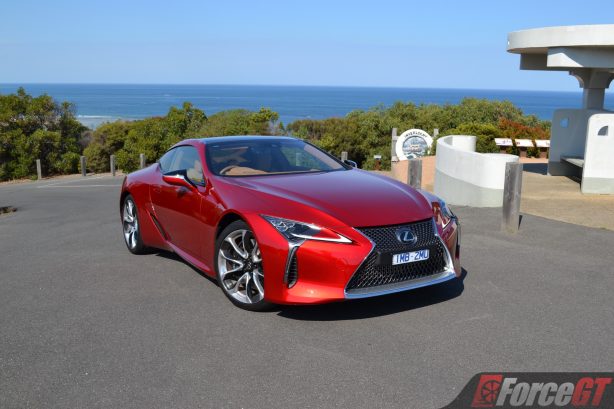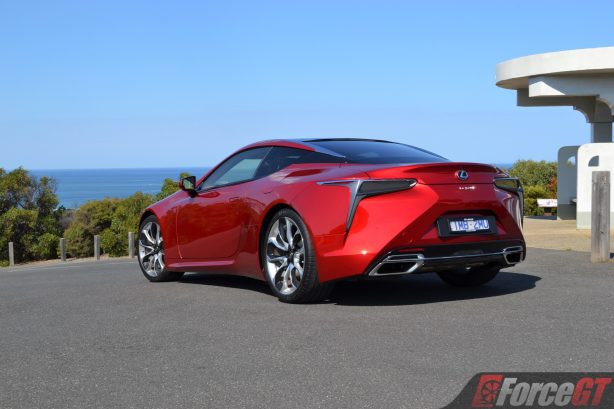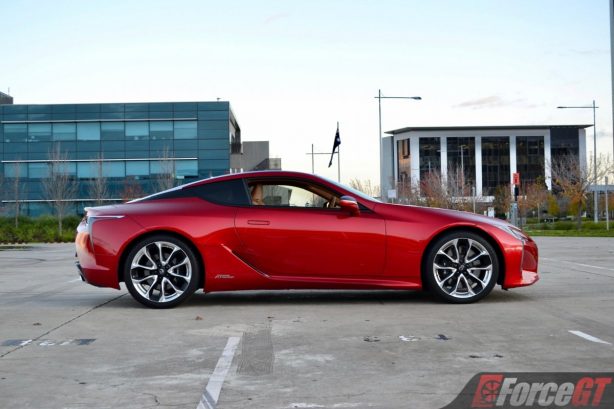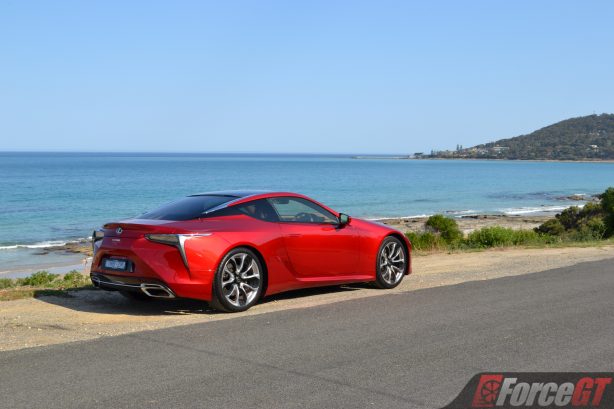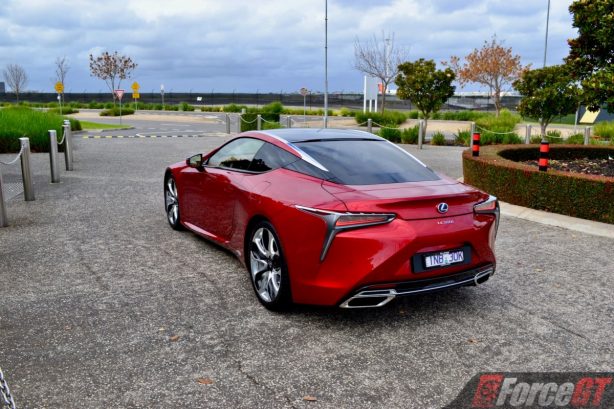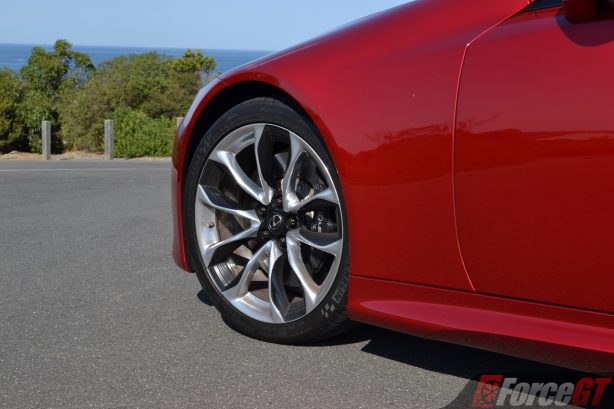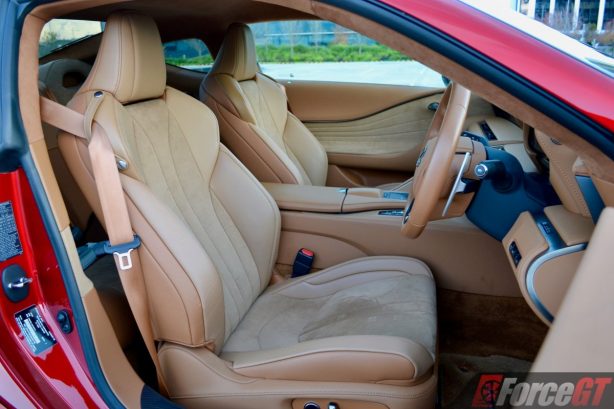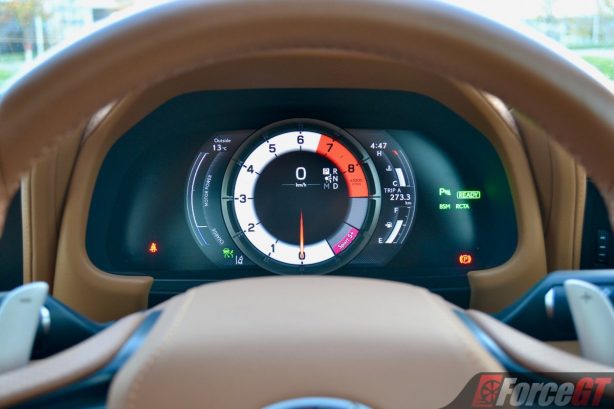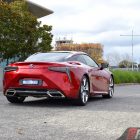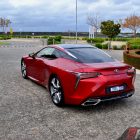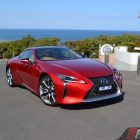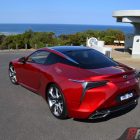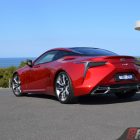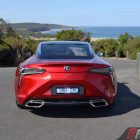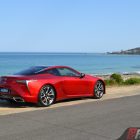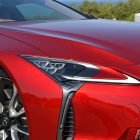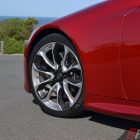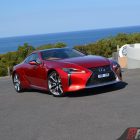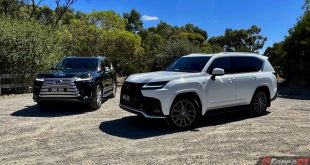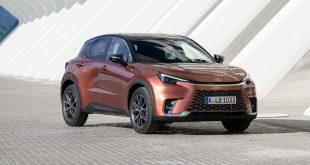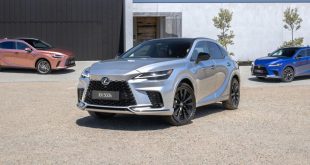In my book, there are a few cars that I would buy on looks alone. They are the Alfa Romeo 4C, Aston Martin Vanquish and this, the Lexus LC.
Launched in 2017 as the new flagship coupe for Lexus, the LC is the road-going version of the LF-LC concept car on which it is based, literally. The Japanese luxury marque is not known for transforming concept to production without significant watering down. But the LC looks almost like a carbon copy of the LF-LC.
This makes the stunning LC like nothing on the road. If you have two hundred big ones lying around, the LC is the most beautiful and captivating grand tourer you can buy today. Its road presence is simply unrivaled, and you will need to get used to the constant attention that this thing gets.
Once you have decided to buy one, you are faced with yet another decision to make. Should you get the V8 LC 500 or the hybrid LC 500h? Naturally, the V8 would be the pick for many, but if you appreciate new technology and seek a balance of performance and efficiency, there is much appeal in the hybrid.
Having spent a week in each version, I wish I could keep both, as they have such different personalities.
Lexus LC 500 vs LC 500h: The key differences
Despite looking virtually identical, the two LC variants have entirely different drivetrains.
The LC 500 is powered by a naturally-aspirated 5.0-litre V8 petrol engine delivering a maximum power output of 351kW @ 7,100rpm and peak torque of 540Nm @ 4,800rpm. It’s mated to a 10-speed torque converter automatic transmission which channels drive to the rear wheels. There is also a rear limited slip differential (optional in the LC 500h).
It’s all very conventional and familiar in the LC 500. Essentially, it’s the sort of formula you would expect in a grand coupe – a big muscly V8 up the front, transmission in the middle, and propulsion in the rear.
The hybrid LC 500h is a little innovative and sophisticated. The power unit is a 220kW naturally-aspirated 3.5-litre V6 petrol engine, paired with an electric motor to deliver a combined output of 264kW and 348Nm.
The electric motor gets its power from a light-weight lithium-ion battery pack located toward to rear of the car. As the LC 500h is a self-charging hybrid, the battery is charged every time you brake or coast. There is no need to visit a charging point or plug a lead into a power socket.
Now, this is where things get interesting (if you like geeky tech). All that power is sent through what is known as a Multi-Stage Hybrid drivetrain. Basically, it consists of a 4-speed automatic gearbox and a continuously variable transmission. The 4-speed auto-CVT combo is able to multiply each of the first three physical gears in the automatic transmission three times – turning three real ratios into nine virtual ones; the fourth physical ratio acts as an overdrive, enabling the V6 to spin at a much lower rpm when cruising.
In essence, the automatic gearbox works in conjunction with the CVT to deliver 10 specific gear ratios, just like the 10-speed auto in the V8 LC 500.
How different do they drive?
Before we dive into driving impression, let’s talk about how they sound. The V8 LC 500 is, of course, the model that offers a much more dramatic soundtrack. It all starts as soon as you thumb the engine start button, at which point the big V8 comes alive in a glorious roar before settling down in a deep burble. Feed in the revs and that V8 symphony starts to build. It’s all still fairly civilised up until this point but take it up and over 4,000rpm, the V8 takes a twist in personality, screaming like a chimp on fire all the way to its 7,000rpm cut off.
When it comes to aural sensation, nothing beats a high-revving atmospheric V8 like the one in the LC 500. And trust me, you will not get enough of it.
Meanwhile, the LC 500h hybrid makes no sound at all on start up. With it starting up in electric vehicle (EV) mode, it’s so eerily quiet that you sometimes have to check if the ignition is actually on.
On the move with the engine running, it’s no scintillating V8 music, but the V6 does still sound properly enthusiastic, though some of it is digitally generated.
Like the way they sound, the variants have vastly different driving flavours, too. As expected, the V8 model is a fabulous cruiser, with it beautifully effortless at just about anywhere in the rev range. If you are simply cruising around, the LC 500 drives just like what you would expect from a Lexus – serene, refined and very civilised.
Plant the throttle and the V8 instantly wakes from its slumber, before pulling hard all the way to the limiter. Lexus has not included a launch control but the 0 to 100km/h sprint time of 4.7 seconds is still pretty quick.
Weighing in at 1,935kg, the LC 500 is a heavy coupe but you don’t necessarily feel all of it. Rather, it feels properly planted and athletic on a stretch of challenging roads. Body roll is kept well under controlled and the nose points keenly into corners. You can choose to grip drive it for sheer pace, or loosen its rear end for some sideway lunacy. Either way, it feels somewhere between a grand tourer (which it is essentially) and a proper sports car. Punting hard the car feels sure-footed, predictable and alive, only struggling for traction at the tightest hairpins.
While it doesn’t give you the sporty shove in the back like the V8 LC does, the LC 500h still has more than enough punch to serve up a blast of a drive on the track or winding roads. Mid acceleration is strong and linear thanks to the instant torque from the electric motor. The dash from 0 to 100km/h takes a claimed 5.0 seconds, just 0.3 of a second slower than the V8. That is pretty remarkable considering the LC 500h is heftier still at 1,985kg.
The 4-speed CVT-combo is quite an impressive piece of tech. It’s hard to pick out the ‘virtual’ gears from the real ones. In fact, it drives just like a conventional 10-speed auto, smooth, crisp, refined and none of the ‘rubber band’ effect so common in CVT-equipped cars.
It’s only when you switch to Sport+ mode, pin the throttle and take it up to its 6,600 rpm cut off that you start to feel a bit of that CVT elasticity, as the revs dances around the optimum powerband to enable the quickest acceleration. The same occurs on downshifts at higher engine speeds, it just isn’t as snappy as a twin clutch or conventional auto.
Despite the added weight, the hybrid feels a tad more balanced and neutral compared to the V8 thanks to better front/rear weight distribution (51/49 compared to the V8’s 52/48). The front is lighter due to the smaller V6 engine and the back is heavier thanks to the positioning of the hybrid drive battery just above the rear axle.
The LC 500h is just lacking the drama and attitude of the LC 500, otherwise it is easily just as dynamically sharp as the V8.
Regardless of which model you choose, one thing certain is that both cars will cacoon you in supreme comfort on long trips. The LC is a car you take on that 8-hour interstate drive. It soaks up bumps and ruts with aplomb, resulting in a ride that is firm but every bit as smooth as a luxury sedan.
The Interior
Both the LC 500 and LC 500h have nearly identical cabins. At nearly $200k, the LC is an expensive car but the interior feels double that price point, especially in the tan colour of my LC 500h test car. It feels truly exotic and original. Typical of Lexus, everything is built to an exceptionally high standard, from the quality of the leather and Alcantara to the delicate feedback of the buttons and the minuscule gap between panels.
The seats – fully electric with heating and ventilation – are the best in the business. They are snug and contoured perfectly to your body. Lexus claims they went through 50 different seat designs to find the best one. The effort certainly has paid off.
The driving position is also spot on, you sit low and tight, with the steering wheel at chest level and excellent forward visibility through the vast front windscreen.
The LFA-inspired digital instrument cluster is hands down my favourite part of the interior. It features a centre cluster that slides sideways to reveal a menu at the push of a steering wheel button. It’s been featured in many Lexus F Sport models since making debut in the LFA but it’s still as cool as ever.
What’s not is the infotainment system and the associated Lexus Remote Touch interface. With dated graphics and a clumsy touchpad-style control, the system is so far behind the competition that it’s in desperate need of an overhaul. Making matters worse, the climate controls are inconveniently hidden away within the infotainment screen, making adjustment a pain.
Both variants are equipped to the brim. A bespoke Mark Levinson premium sound system with 13 speakers is standard, so are the electrically adjusted steering rack and colour heads up display (HUD).
Every LC is also equipped with Lexus Safety System+, featuring Adaptive Cruise Control, Pre-Collison Safety System, Lane Keep Assist, Sway Warning and Automatic High Beam, plus a Blind Spot Monitor, Rear Cross Traffic Alert, reversing camera, eight airbags and tyre-pressure monitor.
Perhaps, the only major difference between the cabins of the LC 500 and LC 500h is in boot space. The V8 model has 197 litres of capacity, while the hybrid model is down 25 litres at 172 litres due to the presence of drive batteries.
So, which one should you choose?
It all comes down to what kind of driving feel you are looking for in a grand coupe. The LC 500 with its muscly V8 engine is undoubtedly the more raucous and engaging of the pair. For outright performance, the V8 LC 500 edges out the LC 500h hybrid but not by much.
The LC 500h, on the other hand, is first and foremost a tech showcase, with performance to boot. Being a hybrid, it’s also much better on fuel. As a luxury showpiece to cruise around, with the occasional weekend back road blast, the LC 500h is just fine.
But if you are an obsessed car nut like me, then it has got to be the V8 LC 500.
Lexus LC 500 | Lexus LC 500h | |
| Design and Comfort | 9.0 | 9.0 |
| Performance and Handling | 8.5 | 7.5 |
| Quality | 9.0 | 9.0 |
| Economy | 7.0 | 8.5 |
| Equipment and Features | 8.0 | 8.0 |
| Overall |
2020 Lexus LC Pricing and Specification
Lexus LC 500 | Lexus LC 500h | |
| Price (excluding on-road costs): | From $194,393 As tested: $194,393 | From $194,553 As tested: 209,553 (with Enhancement Pack) |
| Warranty: | 4 years, 100,000 km | 4 years, 100,000 km |
| Warranty Customer Assistance: | 4 years roadside | 4 years roadside |
| Service Intervals: | 12 months, 15,000km | 12 months, 15,000km |
| Country of Origin: | Japan | Japan |
| Engine: | 5.0-litre normally-aspirated V8 petrol 351kW @ 7,100rpm, 540Nm @ 4,800rpm | 3.5-litre Atkinson V6 petrol + electric motor 264kW @ 6600rpm, 348Nm @ 4900rpm |
| Transmission: | 10-speed automatic | 4-speed + CVT Multi Stage Hybrid automatic |
| Drivetrain: | Rear-wheel drive | Rear-wheel drive |
| Power-to-Weight Ratio (W/kg): | 183.3 | 134.4 |
| 0-100km/h (seconds): | Claimed: 4.7 Tested: 4.8 | Claimed: 5.0 Tested: 5.2 |
| Combined Fuel Consumption (L/100km): | Claimed: 11.6 Tested: 11.8 | Claimed: 6.7 Tested: 8.7 |
| RON Rating: | 98 | 98 |
| Fuel Capacity (L): | 82 | 82 |
| Body: | 2-door, 4-seat, coupe | 2-door, 4-seat, coupe |
| Safety: | 5-star ANCAP, 8 airbags, ABS, VSM, BA, EBD, Autonomous Emergency Braking, radar-sensing all-speed active cruise control, lane-keep assist, automatic high beam, reversing camera, blind spot monitor, forward collision warning, rear cross-traffic alert. | 5-star ANCAP, 8 airbags, ABS, VSM, BA, EBD, Autonomous Emergency Braking, radar-sensing all-speed active cruise control, lane-keep assist, automatic high beam, reversing camera, blind spot monitor, forward collision warning, rear cross-traffic alert. |
| Dimensions (L/W/H/W-B): | 4,770/1,920/1,345/2870 | 4,770/1,920/1,345/2870 |
| Turning Circle Between Kerbs: | 10.8 | 10.8 |
| Kerb Weight (kg): | 1,935 | 1,985 |
| Towing Capacity (kg): | Braked: 2,000/Unbraked: 750 | Braked: 1,500/Unbraked: 750 |
| Entertainment: | 10.3-inch display screen, 13-speaker Mark Levinson audio system, CD Player, DAB+, satellite navigation, USB/AUX/iPod input, Apple CarPlay/Android Auto | 10.3-inch display screen, 13-speaker Mark Levinson audio system, CD Player, DAB+, satellite navigation, USB/AUX/iPod input, Apple CarPlay/Android Auto |
 ForceGT.com Car News, Car Reviews, Video Reviews, Tuning and much more.
ForceGT.com Car News, Car Reviews, Video Reviews, Tuning and much more. 